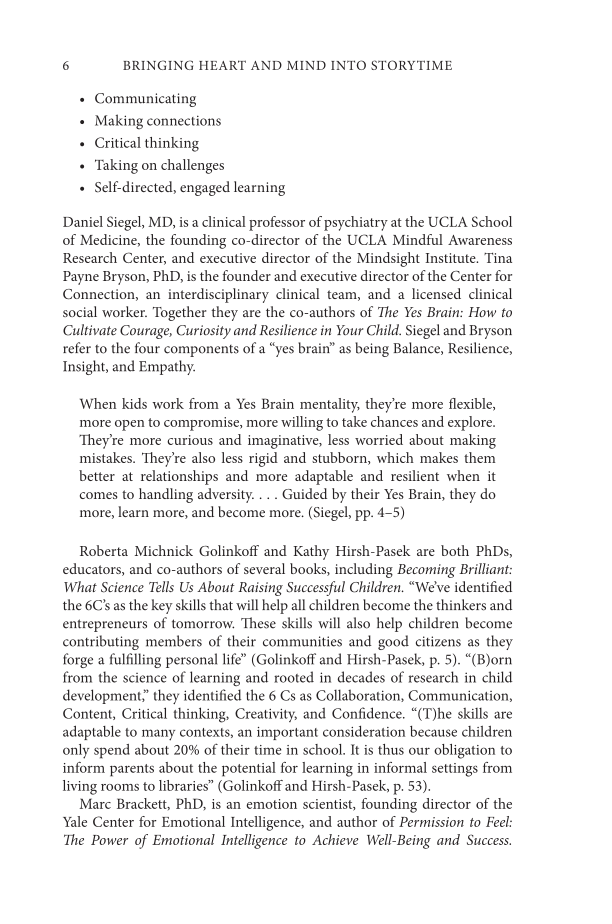6 BRINGING HEART AND MIND INTO STORYTIME • Communicating • Making connections • Critical thinking • Taking on challenges • Self-directed, engaged learning Daniel Siegel, MD, is a clinical professor of psychiatry at the UCLA School of Medicine, the founding co-director of the UCLA Mindful Awareness Research Center, and executive director of the Mindsight Institute. Tina Payne Bryson, PhD, is the founder and executive director of the Center for Connection, an interdisciplinary clinical team, and a licensed clinical social worker. Together they are the co-authors of The Yes Brain: How to Cultivate Courage, Curiosity and Resilience in Your Child. Siegel and Bryson refer to the four components of a “yes brain” as being Balance, Resilience, Insight, and Empathy. When kids work from a Yes Brain mentality, they’re more flexible, more open to compromise, more willing to take chances and explore. They’re more curious and imaginative, less worried about making mistakes. They’re also less rigid and stubborn, which makes them better at relationships and more adaptable and resilient when it comes to handling adversity. . . . Guided by their Yes Brain, they do more, learn more, and become more. (Siegel, pp. 4–5) Roberta Michnick Golinkoff and Kathy Hirsh-Pasek are both PhDs, educators, and co-authors of several books, including Becoming Brilliant: What Science Tells Us About Raising Successful Children. “We’ve identified the 6C’s as the key skills that will help all children become the thinkers and entrepreneurs of tomorrow. These skills will also help children become contributing members of their communities and good citizens as they forge a fulfilling personal life” (Golinkoff and Hirsh-Pasek, p. 5). “(B)orn from the science of learning and rooted in decades of research in child development,” they identified the 6 Cs as Collaboration, Communication, Content, Critical thinking, Creativity, and Confidence. “(T)he skills are adaptable to many contexts, an important consideration because children only spend about 20% of their time in school. It is thus our obligation to inform parents about the potential for learning in informal settings from living rooms to libraries” (Golinkoff and Hirsh-Pasek, p. 53). Marc Brackett, PhD, is an emotion scientist, founding director of the Yale Center for Emotional Intelligence, and author of Permission to Feel: The Power of Emotional Intelligence to Achieve Well-Being and Success.
Document Details My Account Print multiple pages
Print
You have printed 0 times in the last 24 hours.
Your print count will reset on at .
You may print 0 more time(s) before then.
You may print a maximum of 0 pages at a time.







































































































































































































































